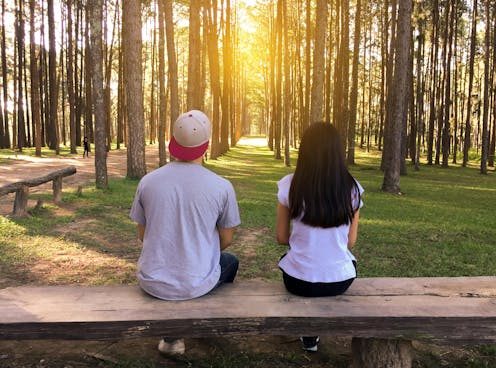‘Do I have to get it in writing?’ Even with compulsory lessons, some teens are confused about how consent works
- Written by The Conversation

Consent education has been mandatory in Australian schools since 2023.
Amid growing public understanding we need to reduce sexual violence and teach young people about healthy relationships, consent is now part of the national curriculum until Year 10.
But is this education working?
Our research with teens suggest some young people are not coming away with an adequate understanding of consent or how to use it in their relationships.
What is consent education supposed to involve?
Before 2023, consent was taught at the discretion of each school as part of relationships and sexuality education classes. The Morrison government announced age-appropriate consent lessons in 2022, to start in the first year of school.
The aim is to teach students about the importance of consent, ensuring they understand it is an ongoing agreement between individuals. This means consent needs to be actively sought and freely given.
It is still largely up to individual schools to work out how they teach the material.
Read more: Wondering how to teach your kids about consent? Here's an age-based guide to get you started
Our research
This research is part of a broader study of young people’s perceptions of online sexual content and experiences of relationships and sexuality education.
For our research, we have spoken to 46 Australian teens (aged 11-17) through a mix of interviews and focus groups. The interviews were done between 2021-2023 and the focus groups were held in December 2023.
As part of this, we asked interviewees what they learned about consent at school. The comments in this article were made after consent education became compulsory.
‘Nothing’ about how to speak to peers
While some young people told us their schools had over-emphasised consent – “like they’ve gone through everything” – other interviewees found the lessons difficult to apply in their lives. As one focus group participant (in a group of mixed genders, aged 14-16) explained:
[Young people are] taught in a basic stereotypical movie way like ‘no’, ‘stop that’, but they don’t actually teach, like, real-life situations.
Lauren* (14) added young people were only taught “if you didn’t want to have sex, then just say no”. As she explained, teens need more practical advice on how to respond to potential partners. This includes:
more focus on examples of other people asking for sex and what [to] do if you were asked to have sex with someone [or] on how to say ‘no’.
Another participant (from a focus group of mixed-genders, aged 14-16) noted how saying “no” was more complex than what school lessons suggested and teens could be taught how to advocate for themselves:
Especially for non-confrontational people ‘cause my friend, [a] creepy guy was being really weird to her, and she wouldn’t say anything about it ‘cause she’s so nice and other people had to step up for her because she wouldn’t tell him that she didn’t want it.
‘We don’t want to get in trouble’
Interviewees told us how consent is often discussed within the context of unwanted sex and sexual assault, or as Tiffany (15) explained “all the negative things”. This may contribute to fears about sexual activity.
Young people also saw consent as a means to avoid “getting into trouble”, rather than checking the comfort and willingness of their sexual partners. As Warren (17) told us:
My friend group that I hang out with, we’re very big on consent. That’s because we’ve heard of cases where people might not have got consent, then they’ve got in trouble because of it […] we don’t want to get in trouble for doing the wrong thing […]
In response to discussions about affirmative consent laws, and the need to demonstrate consent has been sought and given, Warren continued:
I don’t know how I’d go about getting it every time, like, if I just invited a girl over [do] I have to get it in writing or something?
He added he and his friends were thinking about having partners sign a form during their end-of-school celebrations:
if we bring girls back, we want them to sign a consent form or something like that. That’s an idea we had.
There are several issues with teens thinking they need a written form for sex. Not only is it transactional and impractical, it could create an idea someone is not “allowed” to withdraw consent at any time. It also presents consent as a simple box-ticking exercise for “yes” or “no”, when it should be based on mutual respect and care, as part of an evolving discussion.
Going beyond consent
We only interviewed a modest sample of students from Perth. But our study feeds into other research suggesting “consent” in itself may not stop or prevent sexual violence. That is, even if one partner says “yes” it does not mean the sex is free from coercion or is pleasurable.
Other Australian studies have found young people can demonstrate high levels of knowledge about consent but may not know how to apply it.
This suggests young people need more skills and knowledge than simply being told to “seek consent” – a low bar for ethical sex. Consent education also needs to explore communication skills, self-confidence, pleasure, love and relationship dynamics: all topics teens tell us they want to learn about.
This should not be taken as a criticism of passionate, hardworking teachers and schools. But it suggests they need more support and training to provide consent education in ways young people can actually use.
*names have been changed.
Imogen Senior from Body Safety Australia, Gracie Cayley from the Kids Research Institute, Associate Professor Debra Dudek and Dr Harrison W. See from Edith Cowan University contributed to the research on which this article is based.







